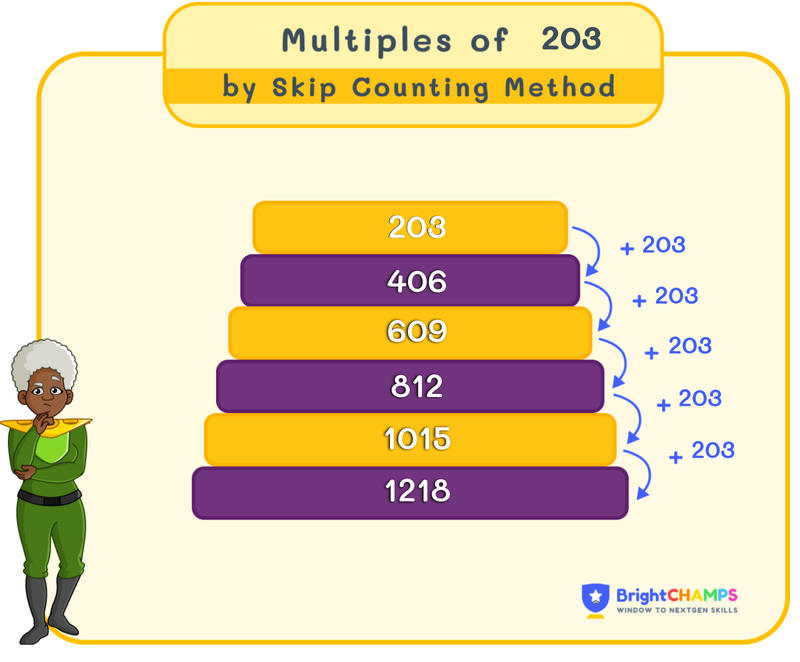
 146 Learners
146 LearnersLast updated on May 26th, 2025

Multiples of 203

In math, multiples are the products we get while multiplying a number with other numbers. Multiples play a key role in construction and design, counting groups of items, sharing resources equally, and managing time effectively. In this topic, we will learn the essential concepts of multiples of 203.
What are the Multiples of 203?
Now, let us learn more about multiples of 203. Multiples of 203 are the numbers you get when you multiply 203 by any whole number, including zero. Each number has an infinite number of multiples, including a multiple of itself. In multiplication, a multiple of 203 can be denoted as 203 × n, where ‘n’ represents any whole number (0, 1, 2, 3,…). So, we can summarize that:
Multiple of a number = Number × Any whole number
For example, multiplying 203 × 1 will give us 203 as the product. Multiples of 203 will be larger or equal to 203.
Struggling with Math?
Get 1:1 Coaching to Boost Grades Fast !

List of First 20 Multiples of 203
Multiples of 203 include the products of 203 and an integer. Multiples of 203 are divisible by 203 evenly. The first few multiples of 203 are given below:
| TABLE OF 203 (1-10) | |
|---|---|
|
203 x 1 = 203 |
203 x 6 = 1218 |
|
203 x 2 = 406 |
203 x 7 = 1421 |
|
203 x 3 = 609 |
203 x 8 = 1624 |
|
203 x 4 = 812 |
203 x 9 = 1827 |
|
203 x 5 = 1015 |
203 x 10 = 2030 |
| TABLE OF 203 (11-20) | |
|---|---|
|
203 x 11 = 2233 |
203 x 16 = 3248 |
|
203 x 12 = 2436 |
203 x 17 = 3451 |
|
203 x 13 = 2639 |
203 x 18 = 3654 |
|
203 x 14 = 2842 |
203 x 19 = 3857 |
|
203 x 15 = 3045 |
203 x 20 = 4060 |
Now, we know the first few multiples of 203. They are 0, 203, 406, 609, 812, 1015, 1218, 1421, 1624, 1827, 2030,...
Operations with Multiples of 203
Understanding the multiples of 203 helps solve mathematical problems and boost our multiplication and division skills. When working with multiples of 203, we need to apply it to different mathematical operations such as addition, subtraction, multiplication, and division.
Sum of first 5 Multiples of 203:
203, 406, 609, 812, and 1015 are the first five multiples of 203. When multiplying 203 from 1 to 5, we get these numbers as the products.
So, the sum of these multiples is:
203 + 406 + 609 + 812 + 1015 = 3045
When we add the first 5 multiples of 203, the answer will be 3045.
Subtraction of first 5 Multiples of 203:
While we do subtraction, it improves our comprehension of how the value decreases when each multiple is subtracted from the previous one. 203, 406, 609, 812, and 1015 are the first five multiples of 203. So, let us calculate it as given below:
203 - 406 = -203
-203 - 609 = -812
-812 - 812 = -1624
-1624 - 1015 = -2639
Hence, the result of subtracting the first 5 multiples of 203 is -2639.
Average of first 5 Multiples of 203:
To calculate the average, we need to identify the sum of the first 5 multiples of 203, and then divide it by the count, i.e., 5. Because there are 5 multiples presented in the calculation. Averaging helps us to understand the concepts of central tendencies and other values. We know the sum of the first 5 multiples of 203 is 3045.
203 + 406 + 609 + 812 + 1015 = 3045
Next, divide the sum by 5:
3045 ÷ 5 = 609
609 is the average of the first 5 multiples of 203.
Product of First 5 Multiples of 203:
The product of given numbers is the result of multiplying all of them together. Here, the first 5 multiples of 203 include: 203, 406, 609, 812, and 1015. Now, the product of these numbers is:
203 × 406 × 609 × 812 × 1015 = 1,014,298,823,460
The product of the first 5 multiples of 203 is .
Division of First 5 Multiples of 203:
While we perform division, we get to know how many times 203 can fit into each of the given multiples. 203, 406, 609, 812, and 1015 are the first 5 multiples of 203.
203 ÷ 203 = 1
406 ÷ 203 = 2
609 ÷ 203 = 3
812 ÷ 203 = 4
1015 ÷ 203 = 5
The results of dividing the first 5 multiples of 203 are: 1, 2, 3, 4, and 5.

Common Mistakes and How to Avoid Them in Multiples of 203
While working with multiples of 203, we make common mistakes. Identifying these errors and understanding how to avoid them can be helpful. Below are some frequent mistakes and tips to avoid them:
Level Up with a Math Certification!
2X Faster Learning (Grades 1-12)


Multiples of 203 Examples

Problem 1
Riya is organizing a charity marathon where participants run laps around a 203-meter track. If each participant runs 203 meters every lap, how far will a participant run if they complete 5 laps?

1015 meters
Explanation
Each lap is 203 meters. To find the total distance run after 5 laps, we multiply the distance of one lap by the number of laps.
Distance per lap = 203 meters
Number of laps = 5
203 × 5 = 1015
A participant will run 1015 meters after 5 laps.

Problem 2
In a music festival, there are 203 seats in each row. If the organizer sets up 3 rows, how many seats will be available in total?

609 seats
Explanation
To find the total number of seats, multiply the number of seats per row by the number of rows.
Seats per row = 203
Number of rows = 3
203 × 3 = 609
There will be a total of 609 seats available.

Problem 3
A farmer plants trees in blocks of 203 trees each. If she plants 4 such blocks, how many trees has she planted in total?

812 trees
Explanation
Multiply the number of trees per block by the number of blocks to find the total number of trees planted.
Trees per block = 203
Number of blocks = 4
203 × 4 = 812
The farmer has planted 812 trees in total.

Problem 4
A factory produces 203 widgets every hour. If the factory operates for 6 hours in a day, how many widgets does it produce in a single day?

1218 widgets
Explanation
Multiply the number of widgets produced per hour by the number of hours the factory operates.
Widgets per hour = 203
Operating hours per day = 6
203 × 6 = 1218
The factory produces 1218 widgets in a day.

Problem 5
During a fundraising event, each donor pledges to donate $203. If there are 7 donors, how much money will be raised in total?

$1421
Explanation
Multiply the donation amount per donor by the number of donors to find the total amount raised.
Donation per donor = $203
Number of donors = 7
203 × 7 = 1421
A total of $1421 will be raised from the donors.

Turn your child into a math star!
#1 Math Hack Schools Won't Teach!


FAQs on Multiples of 203
1.How do you find the multiples of 203?
2.What is the LCM of 203 and 7?
3.What are the real-life applications of Multiples of 203?
4.Are multiples of 203 finite or infinite?
5.Is there any odd multiple of 203?
6.How can poems help children in Qatar memorize the Multiplication Table and Multiples of 203?
7.Can learning the Multiplication Table influence creativity in solving Multiples of 203 challenges for kids in Qatar?
8.How do language and cultural differences in Qatar affect the way children learn the Multiplication Table and Multiples of 203?
9.What role does brain development play in mastering the Multiplication Table and Multiples of 203 among early learners in Qatar?
Struggling with Math?
Get 1:1 Coaching to Boost Grades Fast !

Important Glossaries for Multiples of 203
- Multiple: A multiple represents the product of a number that may be multiplied by an integer. For example, multiples of 203 include 203, 406, 609, 812, etc.
- Number pattern: This refers to how numbers are listed. It should follow a certain sequence. Multiples of 203 are the numbers that consist of the number pattern of 203.
- Odd number: An odd number refers to any number that cannot be divided by 2 without leaving a remainder. All multiples of 203 can be odd.
- Divisor: It refers to any number by which another number can be divided without leaving any remainder. 1, 7, 29, and 203 are the divisors of 203.
- Factor: A factor is a number that divides another number completely, leaving no remainder. For 203, the factors are 1, 7, 29, and 203.
Explore More multiplication-tables
![Important Math Links Icon]() Previous to Multiples of 203
Previous to Multiples of 203
About BrightChamps in Qatar


Seyed Ali Fathima S
About the Author
Seyed Ali Fathima S a math expert with nearly 5 years of experience as a math teacher. From an engineer to a math teacher, shows her passion for math and teaching. She is a calculator queen, who loves tables and she turns tables to puzzles and songs.
Fun Fact
: She has songs for each table which helps her to remember the tables




